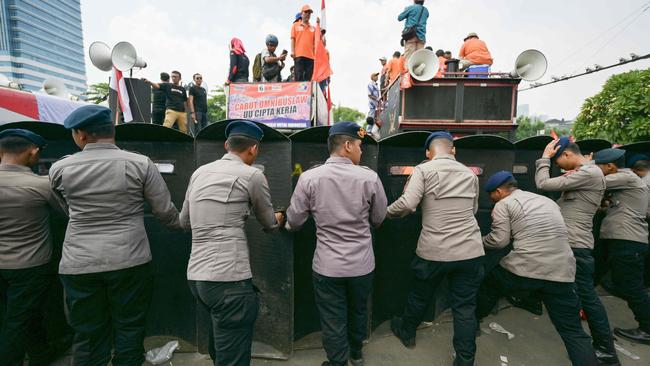Indonesia crisis defused after poll ‘stitch-up’
Indonesia has pulled back from the brink of a political crisis after MPs deferred a vote on electoral law revisions that critics said would have cemented a ‘political cartel’.

Indonesia has pulled back from the brink of a political crisis late on Thursday amid widespread protests over a parliamentary bid to defy Constitutional Court rulings on upcoming regional elections.
The two judgements would have blocked President Joko Widodo’s second son from contesting November regional elections and lowered the nomination threshold for candidates.
After a day of unrest in which thousands of protesters gathered outside Jakarta’s House of Representatives, lighting fires and later tearing down security gates, one of incoming president Prabowo Subianto’s closest aides Sufmi Dasco Ahmad announced on social media that plans to override the two judgments had been “cancelled”.
“Therefore when registering for the regional elections on August 27, what will apply is the Constitutional Court’s decision,” Dasco, who is also deputy house speaker, wrote.
Demonstrations kicked off in cities across Java early on Thursday to protest a planned morning vote on revisions to electoral law that critics said would have cemented a “political cartel” for president-elect Prabowo and undermined the Constitutional Court’s authority.
But with angry crowds gathering outside Jakarta’s parliament building, Mr Dasco announced the plenary session would be delayed for lack of a quorum of MPs.
One MP from Prabowo’s Gerindra party was pelted with bottles and insults after coming out to address the crowd, while a coalition of academics, students and civil society groups at a separate protest outside the Constitutional Court building in central Jakarta on Thursday called for a boycott of November’s regional elections.
It accused Jokowi and the parliament of having “hijacked” Indonesian democracy. What has been described by millions of Indonesian social media users as a constitutional “emergency” began on Tuesday when the Constitutional Court lowered the nomination threshold – from 20 per cent of parliamentary votes to around 7.5 per cent of the popular vote – for candidates in November regional elections.
The ruling appeared to address widespread concerns that dozens of elected positions would be won by unopposed candidates, many aligned with Prabowo’s 10-party coalition.
A second court ruling upheld an existing law requiring regional election candidates to be at least 30 years old at the time of nomination. The decision effectively blocked Jokowi’s youngest son, Kaseang Pangarep, 29, from contesting as a candidate for deputy governor.
But within 24 hours parliament tabled an emergency revision to annul the changes that were expected to be ratified on Thursday given all but one party, the Democratic Party of Struggle (PDIP), had agreed to the changes.
Australian National University Indonesia expert Marcus Mietzner said while there was no doubt Jokowi was the “driving force behind the move”, protests in Jakarta, Surabaya and Yogyakarta appeared to have given Prabowo second thoughts.
“I think Jokowi would have pushed through but Prabowo doesn’t want to start his presidency by being hated for helping to save Kaesang,” he told The Australian shortly after revisions to the draft laws were cancelled.
While Jokowi had attempted to downplay concerns by describing the parliamentary deliberations as part of the standard “checks and balances” of government, the dispute appears headed towards a tense political and legal stand-off.
On Thursday the PDIP – the country’s only opposition party after it fell out with Jokowi over his decision to back Prabowo for president – tested the Constitutional Court’s new nomination threshold by naming dozens of regent and mayoral candidates.
PDIP officials even indicated Anies Baswedan, a popular former Jakarta governor, could be among its nominated candidates after his plans to run again for office in November’s gubernatorial race were foiled by the defection of previous support parties to the Prabowo coalition, though that was later questioned by party leader Megawati Sukarnoputri.
Anies led “prayers for democracy” in Jakarta on Wednesday night after earlier posting a message to social media urging MPs to “return the Indonesian constitution and democracy on the right track, in accordance with the ideals of reform”.
Should he regain the Jakarta governorship it would put him in the box seat to contest the 2029 presidential elections, a contest Jokowi is said to hope his son eldest and vice-president elect, Gibran Rakabuming Raka, will win.
Gibran and Prabowo will be inaugurated on October 20.
Australian National University professor Ed Aspinall told The Australian Indonesian politics had “reached a new level of brazenness” which had driven an accelerated democratic decline in recent months as Jokowi sought to shore up a post-presidential powerbase.
“The fact Anies Baswedan – a politician with so much popular support – could be blocked from running through a combination of manipulation and coercion is an extraordinary development in post-Suharto politics,” Professor Aspinall said.
“A system where major candidates are blocked from running is really a new phase in the transition away from democracy to an electoral authoritarian regime.”
Among thousands of demonstrators outside parliament on Thursday, east Jakarta housewife Purwi Lestari Handayani said she had joined the protests because the previous nomination threshold “creates a party oligarchy and political cartel”.
Nabilla Gunawan, 27, said she was unhappy with the decline in Indonesia’s democracy which had accelerated when laws were changed to allow Gibran to run for vice president.
“Things have just been getting worse every day. I feel that this is democracy in name only.”



To join the conversation, please log in. Don't have an account? Register
Join the conversation, you are commenting as Logout